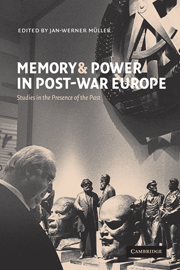Book contents
- Frontmatter
- Contents
- List of contributors
- Acknowledgements
- Introduction: the power of memory, the memory of power and the power over memory
- Part 1 Myth, memory and analogy in foreign policy
- Part 2 Memory and power in domestic affairs
- 7 The past is another country: myth and memory in post-war Europe
- 8 The emergence and legacies of divided memory: Germany and the Holocaust after 1945
- 9 Unimagined communities: the power of memory and the conflict in the former Yugoslavia
- 10 Translating memories of war and co-belligerency into politics: the Italian post-war experience
- 11 Institutionalising the past: shifting memories of nationhood in German education and immigration legislation
- 12 Trials, purges and history lessons: treating a difficult past in post-communist Europe
- Index
10 - Translating memories of war and co-belligerency into politics: the Italian post-war experience
Published online by Cambridge University Press: 22 September 2009
- Frontmatter
- Contents
- List of contributors
- Acknowledgements
- Introduction: the power of memory, the memory of power and the power over memory
- Part 1 Myth, memory and analogy in foreign policy
- Part 2 Memory and power in domestic affairs
- 7 The past is another country: myth and memory in post-war Europe
- 8 The emergence and legacies of divided memory: Germany and the Holocaust after 1945
- 9 Unimagined communities: the power of memory and the conflict in the former Yugoslavia
- 10 Translating memories of war and co-belligerency into politics: the Italian post-war experience
- 11 Institutionalising the past: shifting memories of nationhood in German education and immigration legislation
- 12 Trials, purges and history lessons: treating a difficult past in post-communist Europe
- Index
Summary
The 1940s were the formative years for conflicting memories in post-war Italy. During the second half of that decade different sets of memories were linked to different political choices and translated into the exclusive heritage of various political forces. The multiplicity of conflicting memories remained intact because a general, that is, national, process of recasting collective memories, as in the case of other defeated countries, did not take place. This chapter provides an interpretation of why no unifying national memory emerged in Italy after the Second World War. It also suggests that a pattern of national amnesia versus the ‘counter-cultural’ left-wing form of remembrance of the Resistance took its place.
The main argument of this chapter revolves around the question of how the post-war Italian split between a political system dominated by the Christian Democrats and a civil society penetrated by the communists operated on the level of memory. Indeed, the rebirth of the new democratic Italy was based on both amnesia and remembrance of the Resistance. The latter inspired the Italian constitution and the former, at the cost of fifty years of Christian Democratic hegemony, made possible economic prosperity and Italy's military security in NATO.
While the moderate Italian governments capitalised first on the shock of defeat and later on the ‘communist danger’ for their pragmatic political usefulness, the left cultivated memories of the anti-Fascism experience in the form of an almost exclusive heritage and, as a result, it was very slow in re-examining them.
- Type
- Chapter
- Information
- Memory and Power in Post-War EuropeStudies in the Presence of the Past, pp. 223 - 243Publisher: Cambridge University PressPrint publication year: 2002
- 6
- Cited by

